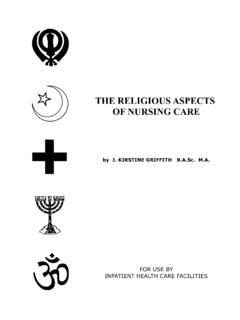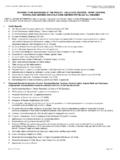Transcription of Cognitive Behavioral Therapy With Religious and Spiritual ...
1 JOURNAL OF SPIRITUALITY IN MENTAL HEALTH. 2016, VOL. 18, NO. 4, 253 282. Cognitive Behavioral Therapy with Religious and Spiritual Clients: A Critical Perspective Kathryn M. Carlson and A. Antonio Gonz lez-Prendes School of Social Work, Wayne State University, Detroit, Michigan, USA. ABSTRACT KEYWORDS. Religion and spirituality (R/S) are important factors in the lives Cognitive Behavioral Therapy ; counseling and of many individuals. Yet, R/S and their impact on mental health psychotherapy; mindfulness;. are topics that are often overlooked in clinical practice. We religion; spirituality offer a critical perspective on the integration of R/S in cogni- tive- Behavioral Therapy (CBT). We discuss factors that have contributed to the relative lack of attention to R/S in main- stream psychotherapies in general and CBT in particular, and examine the use of CBT with R/S clients.
2 We suggest ways to conceptualize and adapt CBT strategies, including mindfulness, so that they can be effectively used with R/S clients. Religion and spirituality (R/S) are important factors in people's lives, and often have a significant impact on physical and psychological health. According to the Pew Research Center (2015), 89% of adult Americans report that they believe in God; 63% report absolute certainty that God exists; 53% report that religion is very important in their lives; and 37%. attend Religious services at least once a week. At the same time, a number of studies have suggested a positive relationship between R/S involvement and health outcomes (Carmody, Reed, Kristeller, & Merriam, 2008; Contrada et al., 2004; Hill, Angel, Ellison, & Angel, 2005; Hill, Burdette, Angel, &.)
3 Angel, 2006; Ironson, Stuetzle, & Fletcher, 2006; la Cour, Avlund, & Schultz- Larsen, 2006; Leigh, Bowen, & Marlatt, 2005; Litwin, 2007; Reyes-Ortiz et al., 2006; Tully et al., 2006; Yakir, Anaki, Binns, & Freedman, 2007). A review of 3,300 studies conducted between 1872 and 2010 concluded that R/S can lead to better mental health, increased adaptability to problems, and a lower risk for physical problems (Koenig, 2012). For many individuals, R/S beliefs have the potential to reduce stress, increase positive emotions, give meaning to adversity and enhance one's sense of purpose (Koenig, 2012). The growing evidence on the relationship between R/S and health out- comes suggests that clinicians must attend to their clients' R/S beliefs in psychotherapy. According to Weisman De Mamani, Tuchman, and Duarte (2009), spirituality and Therapy have similar goals: both religion/spirituality CONTACT A.
4 Antonio Gonz lez-Prendes School of Social Work, Wayne State University, 5447 Woodward Avenue, Detroit, MI 48202, USA. 2016 Taylor & Francis 254 K. M. CARLSON AND A. A. GONZ LEZ-PRENDES. and Therapy aim to increase a sense of identity, to answer questions about life's meaning, and to encourage social support networks (p. 349). Therapy seeks to build on clients' strengths and resources, and R/S are often a source of strength for many clients (Van Wormer & Davis, 2013). Indeed, a study of mental health centers across the United States found that more than half of clients seeking counseling wished to incorporate spirituality into their treat- ment (Rose, Westefeld, & Ansely, 2001). The importance of R/S in clinical practice is reflected in the standards of various professional organizations in the fields of social work, psychology and counseling.
5 For instance, the Council for Social Work Education (CSWE) added religion to its key characteristics of diversity in 1994, and later added Spiritual development as a central aspect of human behavior (Van Wormer & Davis, 2013). To promote cultural competency in this area, the CSWE established a Religion and Spirituality Work Group in 2011. According to the CSWE (2014): Social workers need to understand religion and spirituality to develop a holistic view of the person in environment and to support the professional mission of promoting satisfaction of basic needs, well-being, and justice for all individuals and communities around the world. The American Psychological Association (APA) has a similar division, the Society for the Psychology of Religion and Spirituality, which is dedicated to promoting research and practice in nonsectarian religion/spirituality (APA, 2014).
6 Similarly, the American Counseling Association (ACA) has the Association for Spiritual , Ethical, and Religious Values in Counseling, which is devoted to professionals who believe that Spiritual , ethical, reli- gious, and other human values are essential to the full development of the person and to the discipline of counseling (ACA, 2015). The importance of assessing the role of R/S in a client's life has also been underscored by assessment models such as RESPECTFUL (Ivey, D'Andrea, & Ivey, 2012). and ADDRESSING (Hays, 2008). Both models emphasize the need to explore the client's R/S identity. However, despite the prevalence of R/S among clients and the recognition of its importance by professionals, R/S often goes unaddressed in Therapy . In this article we explore and discuss ways to integrate R/S in clinical practice within the framework of Cognitive Behavioral Therapy (CBT).
7 CBT. encompasses a number of therapeutic approaches that hold rooted in the fundamental principle that one's thoughts and beliefs are the prime determinant of one's emotional and/or Behavioral responses to life events (A. T. Beck, 1976; Ellis, 1962). In essence, CBT is an information- processing model that maintains that our reactions to situations are influenced by how we cognitively process and interpret ( , meanings, attributions, judgments, etc.) those situations. Moreover, those immediate JOURNAL OF SPIRITUALITY IN MENTAL HEALTH 255. and fluid interpretations of life events are influenced by a set of core beliefs (J. Beck, 2011) that represent the more central, stable, fundamental, and definitive views the individual has about the self, others, and the world at large.
8 These fundamental core beliefs start to develop early in life and often reflect the views and mental representations that the person has internalized from early interactions with parents, families, caretakers, school, and society among others. A significant influence on the formation of one's beliefs and values is one's culture, including the possible influence of R/S views. Given the central importance that one's belief system has in shaping responses within the framework of CBT, we suggest that, for a sensitive and accurate assessment of such beliefs, these must be assessed against the framework of the client's cultural background including R/S. views. CBT is one of the most widely practiced Therapy modalities partly because it has garnered extensive empirical support.
9 Butler, Chapman, Forman, and Beck (2006) conducted a review of meta-analyses which included 16 meta- analytic studies published between 1967 and July 2004, encompassing 332. clinical trials with 9,995 participants and covering 16 disorders or popula- tions. The authors concluded that the evidence from the 16 meta-analyses supports the efficacy of CBT across many disorders with particularly large effect size for unipolar depression, generalized anxiety disorder, panic dis- order with or without agoraphobia, social phobia, posttraumatic stress dis- order, and childhood depressive and anxiety disorders. In another review of 269 meta-analyses (Hofmann, Asnaani, Vonk, Sawyer, & Fang, 2012) the authors evaluated a representative sample of 106 studies published between 2000 and January 2012 covering 17 disorders or populations and concluded that the the evidence-base of CBT is very strong, and especially for treating anxiety disorders (p.)
10 436). The results of this study also suggest strong support for the use of CBT with somatoform disorders, bulimia, anger control problems, and general stress. In addition, varied levels of effective- ness were reported for the use of CBT in the treatment of schizophrenia and other psychotic disorders, substance abuse disorders, depression and dysthy- mia, and bipolar disorders. However, the authors pointed out that except for children and elderly populations, no meta-analytic studies of CBT have been reported on particular subgroups, such as ethnic minorities and low income samples (p. 436). Other empirical studies have also provided support for the use of CBT with depressed and anxious youth (Chu & Harrison, 2007);. schizophrenia and schizoaffective disorders (Wykes, Steel, Everitt, &.







